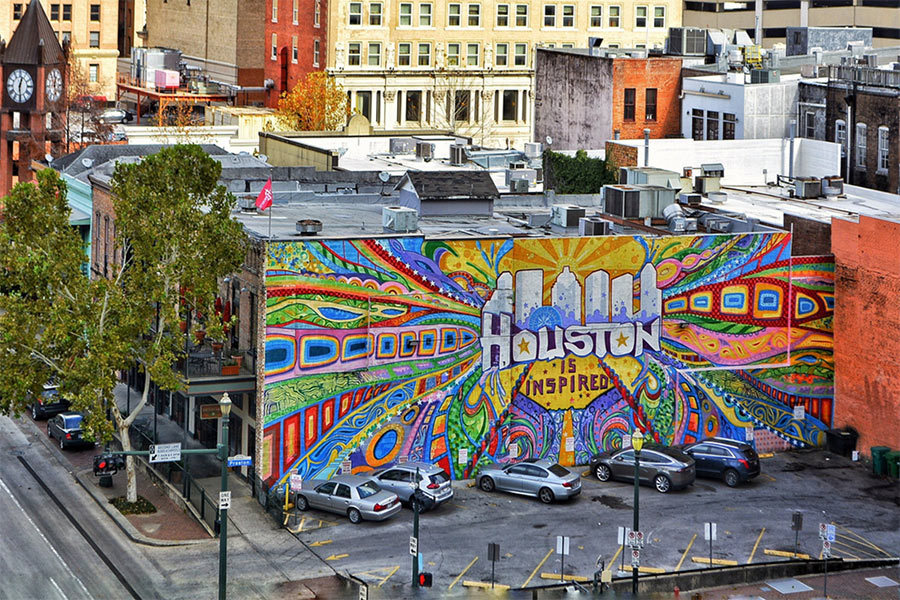
- Land Sold in Katy for Future 1,600-Acre Master-Planned Community [HBJ ($)]
- Multilevel H-E-B in Bellaire Hits the Market [HBJ ($)]
- Retirement Community Watercrest at Kingwood To Add Assisted Living Component [Houston Chronicle]
- Georgetown’s Affordable Housing Options Have a 4- to 6-Year Waitlist [Community Impact Newspaper]
- Houston Suburbs Have Exceeded Harris County Population Growth in Latest Census Data [The Urban Edge]
- Environmental Defense Fund: Air Pollution in Houston-Galveston Region Could Increase Under EPA Loophole [Houston Chronicle]
- 1.8-Mile Woodlands Waterway Completed After 18 Years [Community Impact Newspaper]
- Gigantic Water Tunnels Won’t Save Houston from the Next Harvey [Grist]
Photo of Gus S. Wortham Fountain: Marc Longoria via Swamplot Flickr Pool
Headlines





Re: Houston Suburbs Exceeded Harris County Population Growth
.
I skimmed through the first set of charts and narrative but the article is trying to make drama when there really isn’t any to be had. Even with the “drop”, Harris County is still increasing at about 1% a year. Based on a population of 4,092,000, that’s an added 40,920 people a year to cram in. (Don’t forget all of their cars.)
.
Call me when we have a net decline in population. We could use fewer people in the county: it would ease traffic and strain on our infrastructure.
Uh, Harris County hasn’t had population loss, it has had population *growth* loss. Might want to fix your headline.
Headline is wrong. Harris County isn’t losing population. It’s population growth rate is declining, but it’s still growing.
The headline “Breaking down Harris County population loss …” is eye-catching, but misleading. The linked article documents a reduction in the County’s growth rate, not a loss.
@Much Ado About Nothing:
Let’s not be like Denverites who complain about every newcomer like they’re personally destroying the city. That attitude is annoying and counterproductive.
.
Houston, like Denver, is NOT a dense area.
.
The fix for traffic congestion isn’t to subtract residents, it’s to build more public transportation and bike lanes so that everyone has better options for commuting to work. The fix for rising housing prices isn’t to shut people out, it’s to build more dense housing (reduce those off-street parking requirements near transit stops and that’ll get a lot easier for developers). The solution to flooding isn’t to cut off development, it’s to build more densely and stop permitting greenfield developments upstream out in the suburbs.
Glad to see that readers of this site are not innumerate like too many of our other good citizens, and journalists (with complicit editors).
Tons of room in the loop. Get rid of parking requirements so people start building in a more dense walkable fashion.
Cars, as we have them today, are a relic anyway. In 5-10 years you’ll get a on demand car in a minute that’ll self drive you to anywhere for a few bucks. Most people won’t have them anyway.
The only thing I got out of the population article is that while net domestic migration to Houston has gone negative, net domestic migration to the four suburban counties mentioned in the study is still positive.
.
Having said that, there is still evidently a drop in domestic migration to those four suburban counties. So even if Houston’s domestic migration exodus only represents a flight to its suburbs (which is not unreasonable), there is still an overall drop across the MSA that still needs to be accounted for somehow.
.
I think that with the economy doing well Houston (and maybe Texas overall) just isn’t the destination it usually is. In other words, now that people might have options they’ve decided to move to better climates. Someone on this thread mentioned Denver; well, if people are actively choosing to move to Denver instead of Houston then that may be ruinously unfortunate for both Houston and Denver.
Just going to say (using the number 10 for simplicity), but if my portfolio was at %10 APR and dipped to %9: I’d have to say I was experiencing loss and losing money. Thank God Swamplot headlines don’t catch my financial attention the same way.
Cody: “Cars, as we have them today, are a relic anyway. In 5-10 years you’ll get a on demand car in a minute that’ll self drive you to anywhere for a few bucks. Most people won’t have them anyway.”
I seriously doubt that. I don’t know for sure, but I believe that the majority of car owners like the freedom of going where they want when they want, without waiting.
The technology may be there in 5 – 10yrs, but no way the regulatory framework will be. I’d put money on it being driverless cars, but with passive drivers = not nearly cheap enough for the masses to utilize.
.
Also, this is truck country. Would be very difficult to manage a large fleet of driverless pickup trucks ready to meet demand on the weekends without much daily demand during the weekdays.
Bill, agreed. Going a little further, your trip in the driverless car will be videotaped and audiotaped. The seats will even have sniffers. You will be data mined like you never imagined.
@ Rusty: You’re most likely already subject to phone-based commercial surveillance, with or without ridesharing.
.
@ joel: I don’t think that anybody could reasonably suggest that driverless ridesharing (and home delivery) will capture 100% of demand under even the rosiest of circumstances, but I also think that it is entirely reasonable to believe that this will catalyze a major paradigm shift that includes many aspects of the urban regulatory environment. It is totally realistic to expect that multifamily units, retail centers, offices, and hotels in the urban core could get by with substantially less parking than is currently mandated.
Car ownership isn’t going away, it’ll just become less and less common. Esp in high density areas as ride sharing becomes automated, quick (in terms of when you use the app till your car arrives), and cheap.
.
I can get an uber to my house in a few minutes and go most places for a few bucks. I still have a car because I have a home and it doesn’t impact my budget. But I could easily get rid of it and simply rent those rare times I drive long distances.